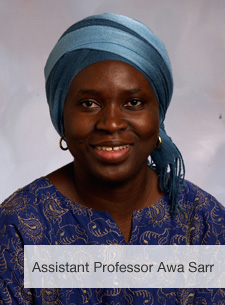 When Assistant Professor Awa Sarr asks her students to write down what comes to mind when they hear the word “Africa,” four terms are among the most popular: poverty, The Lion King, poor people, and snakes.
When Assistant Professor Awa Sarr asks her students to write down what comes to mind when they hear the word “Africa,” four terms are among the most popular: poverty, The Lion King, poor people, and snakes.
“Every time I do that exercise, I realize I’m useful here,” Sarr observes.
Originally from Senegal, Sarr is wrapping up her first year as a professor of francophone literature and Africana studies at UT. This is her first faculty position; previously, she was a graduate student at the University of Illinois, where she recently earned her PhD in francophone literature.
Francophone and francophonie are two terms used to describe the former colonies of France and the people who inhabit them. Francophonie denotes an official organization of fifty-six governments and other state entities around the world that share French as a common language; some member countries, like Cameroon and Morocco, are former French colonies or protectorates, whereas others, like Albania and Egypt, are countries with distinct French-speaking populations. Francophone, on the other hand, is primarily used as an adjective to describe a French-speaking area or population outside of France.
Francophone literature and culture began to emerge as a cohesive entity in the 1930s, with the Négritude movement, in which a group of African and Caribbean black writers and intellectuals strove to respond to French colonialism by communicating and celebrating a distinctly black identity and culture.
“When the Europeans said, ‘Africans, you don’t have a culture or civilization,’ the Négritude movement saw this as an important moment to define an identity,” Sarr explains.
Most of the French colonies or protectorates in Africa became independent from France in the 1950s and 1960s, and much of the francophone literature that emerged in the second half of the twentieth century focused on colonial and postcolonial themes. However, the passage of half a century since the colonial period has led some of today’s scholars to advocate for a halt to using the term francophone as the basis for a discipline.
“Right now it’s a very polemic term. Some writers are trying to get away from that word because of its history, which is tied to colonialism, because the word was created by the French to mean an extension of the French empire. Critics say, ‘You were colonized and just got your freedom; why do you want to go back now?’ To them it doesn’t make sense; we should be on our own,” Sarr says.
However, the French language still unites the former colonies, and many francophone scholars assert that while colonization may not be a period many wish to remember, it is also impossible to ignore.
Although many contemporary francophone writers continue to focus on postcolonial themes in their work, younger authors are starting to move beyond the context of colonization, addressing such topics as gender roles and current political realities.
“The new generation does not have the same relationship with colonization that its predecessors do. Most of them were born in the 1960s, and most countries became independent in the 1960s, so what they know is having dictators, not colonizers, telling them what to do. They are criticizing the current African dictators more than blaming colonizers,” Sarr says.
Regardless of the debate over the nuances of francophone studies, Sarr says she enjoys introducing students to African culture and literature and providing a more comprehensive view of the continent.
“There is a speech by a Nigerian writer that tells of the ‘danger of a single story,’” she says. “And at the end of every class I teach, I hope they will at least have different stories of Africa, not just one. So if they can at least have a second, I think I would be happy.”
